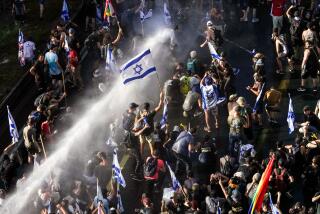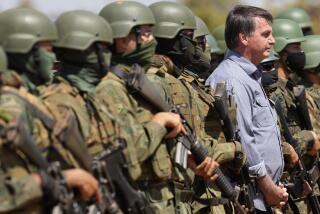Egypt revolution losing steam as military asserts power
CAIRO — The revolutionaries chanted in frustrated knots beneath lifeless flags Friday in Tahrir Square, trying to revive the spirit of a movement that once brought down an autocrat but now has been cleverly outmaneuvered by a powerful military.
The day after a constitutional court dissolved the nation’s first freely elected parliament, Egyptians braced for a presidential election and the prospect that the rebellion that toppled Hosni Mubarak belonged more to history books than today’s headlines. With much at stake, they punched the air, praised their martyrs and made big promises.
“The second revolution is starting,” said Hani Hooty, a college student standing with two friends in a shaded alley just off Tahrir. He watched as TV cameras sought out enough faces to fill a screen and young boys mimicked the rage of their fathers. “None of our goals have happened. The military doesn’t want us to succeed.”
The two-day election that begins Saturday is another in a string of defining moments that has mostly betrayed the country’s transition to democracy. Ahmed Shafik, the last prime minister to serve Mubarak, is running against Muslim Brotherhood candidate Mohamed Morsi. Neither man excites activists, but a Shafik victory would return the remnants of the old guard to power.
That power was evident Friday when state media reported that the ruling Supreme Council of the Armed Forces, or SCAF, had blocked lawmakers from entering parliament and stepped up security patrols around Cairo and other cities. The Justice Ministry this week granted the military wider authority to arrest civilians in what officials fear may be escalating unrest after the presidential election.
The Muslim Brotherhood, which can easily draw tens of thousands into the streets, did not officially take part in Friday’s demonstrations. It urged members instead to concentrate on the election, a sign that Morsi, at least for now, is tying his fortunes to the political process. He has been careful not to anger the military and has vowed to work with the generals if he becomes president.
“Isolate the representative of the former regime through the ballot box,” the Brotherhood said in a statement, referring to Shafik.
The young activists by themselves couldn’t do much to counter the forces against them. They spurred last year’s uprising but have lacked the grass-roots reach and political maturity to bring forth a political renaissance. They quickly encountered, as they did again with Thursday’s court ruling to disband the Islamist-dominated parliament, the deep vestiges of Mubarak’s state.
The ruling that one-third of the chamber’s legislators were unlawfully elected and the court’s decision not to disqualify Shafik over his links to the former regime have reminded protesters that street fervor has its limits.
“I’m completely depressed because the revolution is being wiped out. There is no resurrecting it now,” said Mohamed Kassem, a medical student at Alexandria University. “SCAF is smarter than we thought. We have no strategy.
“We need to unite and develop a revolutionary council immediately. There’s no other option.”
Uncertainty has further agitated the mood. The country has no new constitution to guide it and, without a parliament, the next president will have no legislative balance to his authority. State media reported that parliament Speaker Saad Katatni said the court’s decision was politically motivated, part of the military-backed interim government’s “war” against lawmakers.
“We will save our revolution,” the prominent April 6 movement said in a statement to rally Egyptians to Tahrir. “We will save Egypt from military rule.”
By evening, larger crowds moved into the square but were nowhere near the numbers that propelled the 18-day uprising against Mubarak. Tahrir has often been a tinderbox, seemingly quiet one moment and the next surging with protest. But Shafik’s candidacy, the recent ruling and other setbacks have often left the square surly and forlorn, except for the shouts of vendors and car horns from Cairo’s incessant traffic.
The heat of the day burned into the night as men argued with one another about how best to confront the army. A Twitter account called The Big Pharaoh posted: “So now we have a country with no constitution, no parliament, no president. And military police in checkpoints around the parliament! Ummm.”
Hooty said the presidential election would not make things better.
“I’m not voting,” he said. “We don’t want this election. We can’t achieve what we want with either Morsi or Shafik.”
He doubted that the military would keep its promise to hand power to a civilian government by July 1.
Special correspondent Reem Abdellatif contributed to this report.
More to Read
Sign up for Essential California
The most important California stories and recommendations in your inbox every morning.
You may occasionally receive promotional content from the Los Angeles Times.











